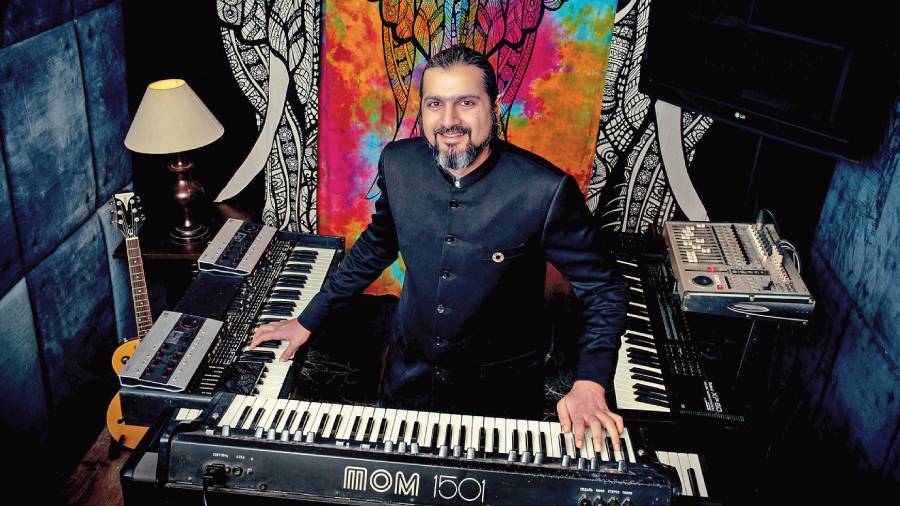What’s music? It can take us back in time or initiate new ways of thinking. It can capture a moment or make us escape a moment. For Ricky Kej, music is divine; it has always been that way. He wants to change the mindset of his listeners through positive reinforcement rather than doom-and-gloom notes. Something that didn’t go unnoticed — yet again — as the 40-year-old collected the second Grammy of his career last week, this time for the album Divine Tides. He has recorded the album with the legendary Stewart Copeland, the drummer who shattered and then reassembled in his special way every beat the rock band Police ever made.
“The pandemic gave the album Divine Tides. It was a pandemic album and to be honest, the album would have never happened if there was no pandemic,” Ricky told us over a call hours after his big night at the MGM Grand Garden Arena in Las Vegas.
By the time Ricky got his Best New Age Album Grammy for Winds Of Samsara (a collaboration with South African flautist Wouter Kellerman) in 2015 he had already been making music for a long time. One must also remember that Ricky is unlike other popular musicians in India. The fantastic A.R. Rahman, too, has two Grammy awards by his side but they are for a movie soundtrack (Slumdog Millionaire), the process of which is very different from what Ricky’s music is all about.
Well, what is Ricky’s music about? Here are excerpts from a conversation before he began his journey back home to Bangalore.
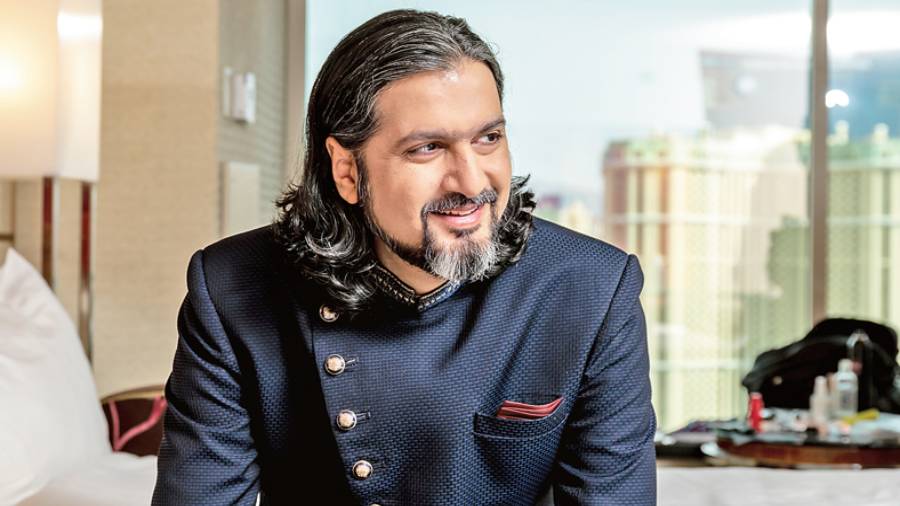
Being an artiste in today’s world, you need to be an entrepreneur. You need to understand business really well. You need to understand marketing sales really well. You need to understand how to present yourself, so I would say being an artiste is almost the exact same thing as creating a start-up where the product is you.... Equip children to be successful in whatever they do rather than trying to dictate what they should do — Ricky Kej
Many things must have been going through your mind after winning the second Grammy of your career....
So, I’ve been in America for a while now, like for the last 30 days because I’ve done a nine-city concert tour, and I have been extremely busy. And that’s why I have not had the time to be nervous, and I’m very grateful for that. It was only on the third (Grammy was held on April 3) that I actually started feeling quite nervous because… the Grammys were supposed to happen on January 31 but got postponed to April 3… so we’ve been a nominee for a very long time; I think the longest time ever anybody has been a Grammy nominee without knowing whether they won or not. The nervousness started kicking in when I was sitting down at the ceremony. I guess when they called out our name, Stewart and I were more relieved than actually excited about winning.
I always wanted to know about this: How do you prepare for the big day? What do you do?
For men, it’s much easier, right? For Stewart it was easy because he must be having a tonne of tuxedos. No issues at all for him. I wore what I regularly wear on stage — a long sherwani. The three shades I am comfortable in are black, blue and white. This time I wore blue. The day starts quite early, like 8.30, 8.45. This time what we did was take a couple of pictures before we went to the ceremony. Stewart and I collaborated for a year on this album over hundreds of Zoom calls, hundreds of phone calls, hundreds of WhatsApp messages and remote recording sessions. We had never actually met in person; we even got nominated for the Grammy but we’ve not met in person. It’s a pandemic album, right? The first time we met was about eight days back in Nashville and then we spent some quality time in Nashville. Then we spent some quality time in Los Angeles and then later on in Vegas.
We wanted to take a couple of good pictures with each other. We reached my hotel room in Vegas. I was staying at the same hotel where the ceremony was being held (MGM Grand Garden Arena). We got ready for a professional photographer and then we went directly to the ceremony, reaching around 12. That’s basically the preparation. Of course, for women it starts very early… I would say, at about 7-7.30.
In the seven years between the two Grammys, how has life changed for you and how have you evolved as a musician?
It has changed quite considerably, and that’s the reason why this Grammy is very special to me, because the previous Grammy, at that particular point in time… I thought I made fantastic music and all of that stuff I do. But I grew much more as a musician in the last seven years, matured much more as a human being. Also, at this Grammy, the album was a collaboration with a living legend, a person who has sold more than 75 million copies of his albums and pretty much every publication around the world calls him one of the greatest drummers in the history of music. He’s done over 50 movie soundtracks, done soundtracks with people like Francis Ford Coppola and Oliver Stone. I grew up with posters of him on my wall and to have an opportunity to stand on the same stage and win a Grammy was quite a surreal experience.
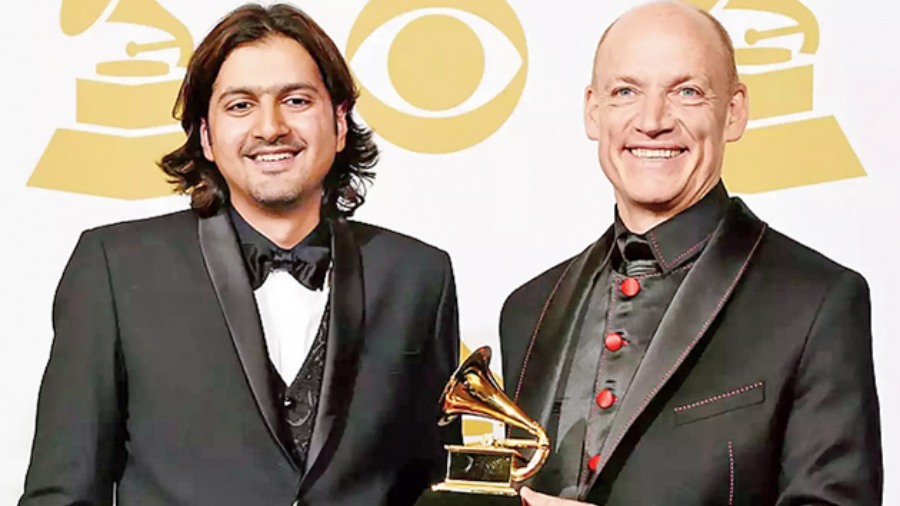
Ricky Kej’s first Grammy was for the album Winds Of Samsara (a collaboration with South African flautist Wouter Kellerman (in picture right) and his latest is with Stewart Copeland (in picture far right)
How did you meet Stewart Copeland in the first place, even if it was virtually?
I had an opportunity to collaborate with him in 2016 on just one song. And that collaboration happened through artiste managers, so I never actually got to interact with him. Then when the pandemic hit, I started working on this album. I started working on some music and I felt very strongly that I needed a very, very good collaborator for this album, somebody who could steer the direction of the album; somebody who could go right with me and somebody who was a virtuoso musician. The only person who came to mind was Stewart Copeland and it was a huge honour to actually get him. I mustered up the courage and I asked him whether he would like to join me on this journey and luckily, he agreed.
What I like most about your music is how you offer a straightforward ode to life around you. What do you turn to for your creative flow and what brings out the best in you?
I guess for me nature is my greatest muse. I travel a lot to the forest and even nature documentaries inspire me to make music and also things I feel strongly about, like there’s this one song which is not entirely nature, but the feeling is the same. There is this song called Art of Devotion (from the album Divine Tides) where the music is inspired by this 2,000-year-old lost wax technique of creating divine statues. That was very interesting for me. It happens in Swamimalai in Tamil Nadu. Artisans use soil from the river bed of the Kaveri. It’s a tradition that’s still alive. I showed some footage to Stewart and he was equally inspired and that’s how we made that song.
When we spoke in 2015, you said that music was always your priority and dentistry was more of a pact you had with your father. But is there anything from your time studying dentistry that has stayed on with you and made you a patient man?
Not really in terms of education itself, but in terms of going to college for five years. An education never goes to waste. Even though I’ve not used even a bit of what I learned in dentistry, but the discipline of going to college for five years gave me a lot more confidence in life.
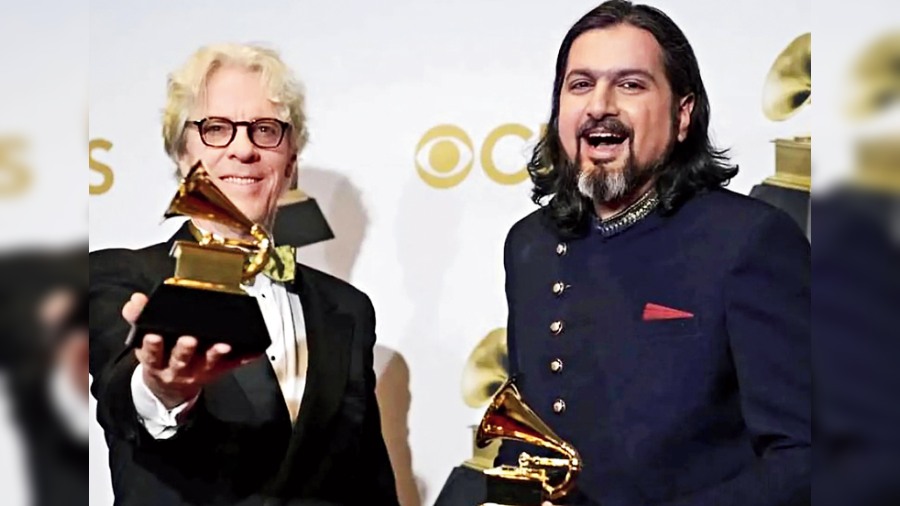
I guess for me nature is my greatest muse. I travel a lot to the forest and even nature documentaries inspire me to make music and also things I feel strongly about.
How did your parents react when you decided to take up music full-time?
They knew it was coming because even during dentistry, in the evenings I was doing professional music and I already had a thriving career during that period. So they knew it was coming once dentistry was over. There’s no way I was going to become a dentist, so all that I guess they were worried about was me dropping out of college. But I’d given them a commitment that I will finish college.
Do parents these days give children more freedom when it comes to choosing a career path?
I guess. With time, parents are becoming more and more tolerant towards alternative career and they understand that this is happening because of the whole entrepreneurship boom — kids wanting to work for themselves rather than working for somebody else. I guess that has carried on over to the arts; parents understand that. Also, being an artiste in today’s world, you need to be an entrepreneur. You need to understand business really well. You need to understand marketing sales really well. You need to understand how to present yourself, so I would say being an artiste is almost the exact same thing as creating a start-up where the product is you.
That’s well put....
At the end of the day, the product is you. You know you’re selling you. An artiste has to be pretty much an all-round person. What parents need to do is that they just need to instill values into their kids rather than forcing them into boxes, you know… where you have to be an engineer or a doctor or a dentist or whatever. I think it’s all about instilling values of hard work, honesty and empathy. Equip children to be successful in whatever they do rather than trying to dictate what they should do.
Returning to music, how do you go about researching and discovering music?
The way I make music is based on what I want to do. Since I don’t work in the film industry and I’m not told by a director what to do or I’m not briefed by anybody on music, it’s a lot easier for me. I do not have anything like a writer’s block because I do not have any deadlines. Everything just comes naturally. I’m quite fortunate that I’m able to do that and make a living off it. There’s no active research per se, everything is pretty organic because I travel a lot. In 2019 I visited 13 countries and about 40 cities, did 70 concerts. When I’m travelling, especially if I’m playing at a music festival, there are so many bands playing before me or whatever that I get exposed to all these different forms of music. I constantly update my arsenal of instruments and collaborators. Then I get to meet all these musicians from different traditions, different cultures, and get an opportunity to collaborate with them.
The last two years have been strange for all of us. What did this time mean to you?
The pandemic gave the album Divine Tides. It was a pandemic album and to be honest, the album would have never happened if there was no pandemic because Stewart would have been extremely busy and I would have been extremely busy. We could dedicate all of our time in the studio and wrap up the album.
How do you go about the collaboration process? Do musicians approach you or perhaps you contact them… maybe it’s a two-way street?
True, it’s both ways for sure. At times, a musician gets in touch with me. At times, I watch a musician perform live at a music festival and then I just go backstage to say ‘hello’ and show my appreciation. That’s how I meet musicians. Or at times, I just come across a YouTube video and I think the music is awesome. There have been times when I’ve just commented on a YouTube video telling them that I would love to get in touch.
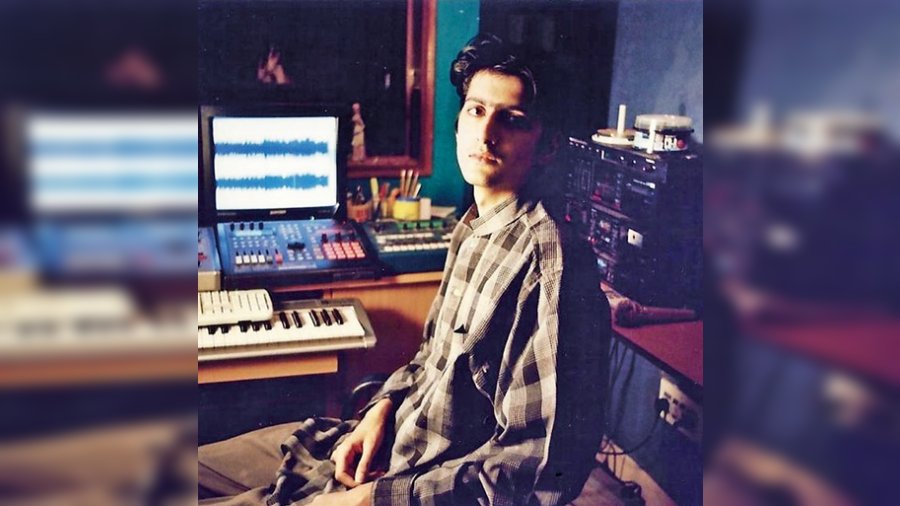
Ricky Kej at his home studio when he was 19 years old. Picture: Ricky Kej
What do you want to be your biggest gift to the Indian music industry?
I would love it if more and more people created music with a purpose, especially in a country like India where there are so many issues; there are so many things that need to be spoken about. When one makes music with a message, especially when it’s about positive social impact or about the environment, there are always two ways to go about things. One way is shaming people into action, like by talking about doom and gloom and showcasing what is wrong in this world. But that’s not the path I’ve taken. That’s like what I call the Greta Thunberg approach. The second approach is basically through positive reinforcement, showcasing love and positivity and energy and all of that stuff, which is what I call the David Attenborough approach — showcasing what is beautiful in this world, making everyone fall in love with the natural world and hopefully through that love people will find it within themselves to protect, to conserve and to sustain. That’s the approach which I’ve taken with my music… using positive reinforcement and drawing people in rather than turning people off.
When it comes to all the problems, like we face so many social problems… poverty, malnutrition, education, gender inequality, water or sanitation and, of course, the environment, climate change species extinction, loss of biodiversity ecosystems… the biggest threat is the thought we have that somebody else will make a difference because what is actually needed is behavioural change and for everybody to understand that tiny incremental changes that people make in their own lives can actually make a huge difference. I guess music can play a very important role in this case because you can showcase a tonne of scientific data to people, you can give a lot of speeches, but what is needed is to speak to the emotions of people and music is a very powerful emotional language.
Do you plan to move to Nashville in the future?
Actually, my US following is not just in Nashville, I think Nashville would be one of those smaller cities. But the point is that I’m never going to move out of India. That is for sure.
Bangalore all the way?
Bangalore is my home and it will always be my home for sure.
So, what do you do think about the Grammy wins when you have nothing to do?
I still have only one Grammy because what happens is that the Grammy they give on stage is a dummy award and they send the real one after about two months. At the Oscars, they have the award on a shelf and they just give you a trophy, whereas with the Grammy, it’s completely handmade in Colorado by a person called John Billings. He’s called the Grammy Man, the person who actually makes all the trophies. After the Grammy ceremony, the list of awardees is sent to John Billings, who basically creates the Grammy from scratch and he ships them to everyone.
Where do you keep it?
My first Grammy is in my studio. When I receive the second one after two months, I’ll put it right next to the first one.
What next?
I am returning to India for a month and then travel begins; I am going on a tour of Europe.
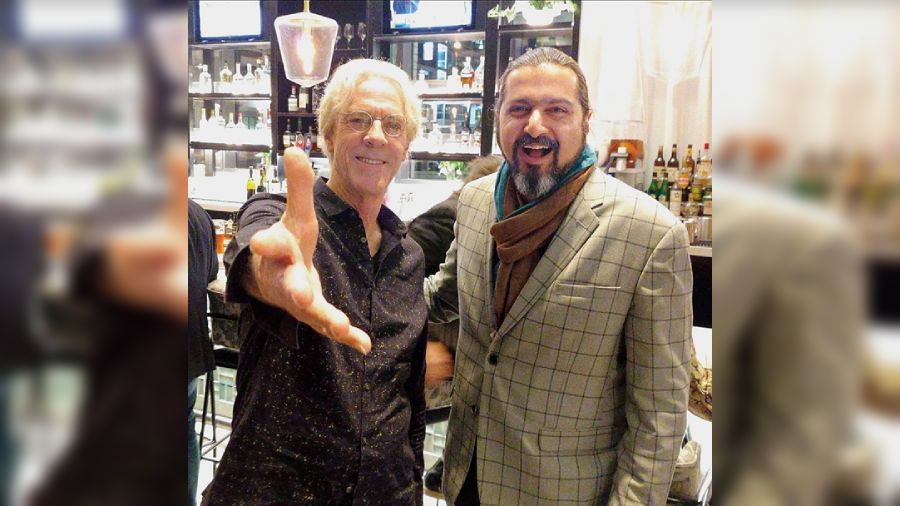
Meeting Stewart Copeland in person
Meeting Stewart Copeland in person… finally
Ricky and Stewart Copeland worked on the album Divine Tides through the pandemic but they never met in person. “Stewart and I collaborated for a year on this album over hundreds of Zoom calls, hundreds of phone calls, hundreds of WhatsApp messages and remote recording sessions. We had never actually met in person; we even got nominated for the Grammy but we’ve not met in person.” Until, of course, before Grammy Awards. Copeland is his “idol and dream collaborator”.
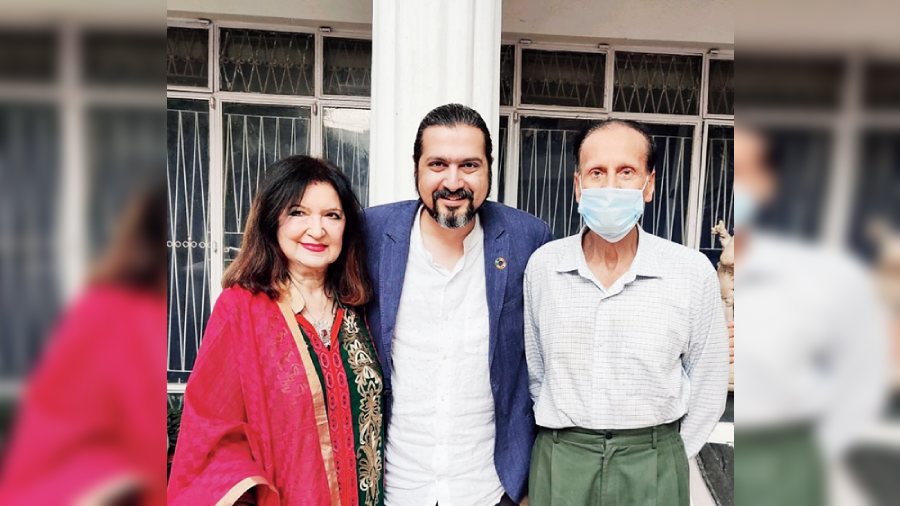
Ricky with his parents who celebrated their 52nd anniversary a few months ago. “Those who know them well will agree that the two of them are extreme polar opposites, but somehow it works! Among all the disastrous events of this pandemic, we have all gotten much closer to each other,” the musician wrote on Instagram
Bangalore will always be home
Ricky Kej was born in North Carolina but his parents decided to move back to India when he was eight years old. Ever since, Bangalore has been his home. A few years ago he told us: “I don’t exactly know the reason but I guess they wanted to raise my brother and me in India. Work often takes me to the US. Whenever I go to the US, I enjoy the first four-five days –– the food, the general ambience –– but after that I start missing Indian food. If you’re truly an Indian, it gets very difficult to live anywhere else. I guess my parents felt the same way.”
